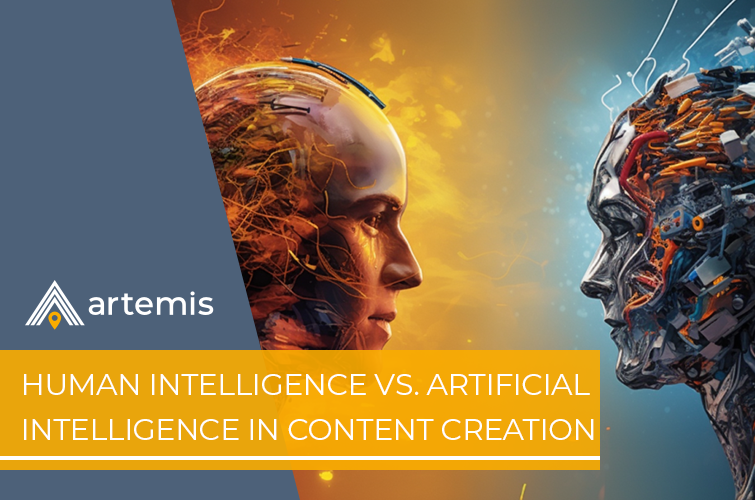Human Intelligence vs. Artificial Intelligence in Content Creation

The old saying ‘content is key’ still rings true in the world of SEO and digital marketing. However, as far as content creation is concerned, the rise of artificial intelligence (AI) has sparked intriguing debates about its capabilities compared to human input and creativity.
As technology advances, generative AI content has become increasingly prevalent, as evidenced by the surging popularity of chatbots like ChatGPT, Bard, and others.
However, understanding the distinctions between AI-generated and human-generated content is crucial. Many fear that without sufficient regulation and control, generative AI tools could potentially replace swathes of hardworking, creative content writers and marketers.
There is underlying uncertainty about whether that’s even possible, and whether AI will be able to replicate or fill the void that quality, engaging human-generated content fills. Not least because AI content has flaws and is not reliable enough to stand on its own. However, with Google’s recent announcements at I/O 2023, again, the question still ponders.
How Does AI-Generated Content Differ from Human-Generated Content?
AI-generated content is created using algorithms and machine learning techniques, requiring various language models and commands to generate text or imagery. While AI tools can produce content quickly and efficiently, they lack all the important nuances and contextual references that human content writers are trained to understand and thread strategically into short- and long-form content.
While AI robots are deemed to be ‘intelligent’, they are not carbon copies of human brains, mere imitations of minor aspects of human intellect. For instance, ChatGPT’s knowledge is only limited to online content up to September 2021, pulling together information from various resources, often rephrasing and re-arranging them syntactically to meet the demands of its prompt.
Human-generated content, conversely, stems from creativity, emotional understanding and experience. This content will, therefore, be more compelling and personalised, adding more tangible value to the reader. Human content often reflects unique stories, personal perspectives and social contexts, and is often more adaptable to account for real-time events and updates that could influence the angle of pieces. AI tools do not account for these fluctuations.
Is AI More Creative Than Humans?
Creativity is a quintessentially human trait, and while AI has made significant strides in generating content, it falls short of capturing the essence of true creativity. While it’s no secret that it can generate structured content on request, or present unique ideas for consideration, as well as important SEO facets like meta descriptions, page titles, keywords and so on, the text is usually devoid of emotion.
AI operates based on patterns and rules it has learned from existing data, lacking the innate ability to think abstractly. Human creativity is fuelled by imagination, emotions, and subjective experiences, enabling the generation of innovative ideas and perspectives that AI cannot replicate.
So, to answer the above question, AI is not necessarily more creative than a human writer. However, its advantages in speed and efficiency cannot be ignored, and tools like ChatGPT could certainly generate large volumes of content at scale. It’s also important to remember that tools like this can provide writers with some inspiration for topic ideas to help them overcome the ever-present issue of writer’s block. Even if a writer utilises an AI tool to generate key points, blog outlines, or title ideas, that’s still progress.
Will AI Take Over Content Creation?
The emergence of AI in content creation has led to concerns about the potential replacement of human content creators. AI tools are constantly being developed, updated and refined, making the hypothetical question a scary – and very real – possibility.
However, because of the questionable quality of AI-generated content, it still needs heavy human involvement and supervision. As such, complete AI domination isn’t likely for the foreseeable future. The more likely scenario is increased collaborations between AI and human content creators, where AI tools can aid our efforts.
High-ranking and valuable content – in Google’s eyes – still has to exhibit evidence of ‘E-E-A-T’, creativity and critical thinking, and it’s unreasonable to assume that AI tools will be able to accurately and convincingly capture all those important nuances and USPs about businesses looking to grow their audience online and drive high-value organic traffic to their website.
In summary, while AI content demonstrates speed and volume, it lacks the depth and creativity that human intelligence brings. Human-generated content retains superiority and value, ensuring more genuine and relatable experiences for audiences. While AI will continue to develop and be influential in aspects of content creation, we should take reassurance in our ability to use these tools to make our lives easier, not view them as direct competition.
At Artemis, we are always staying in the loop with Google’s latest recommendations and suggestions around content quality. As such, all the content we – or rather our team of content writing experts – produce is of the highest standard, engaging, compelling and of value to our clients’ target audience.
As an SEO agency in Sussex, we are also keeping a watchful eye on the developing world of AI and its influence on digital marketing. If you are interested in seeing how we can help you achieve valuable, organic traffic to your site, please don’t hesitate to contact us today.

